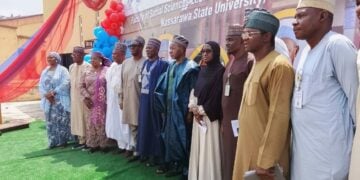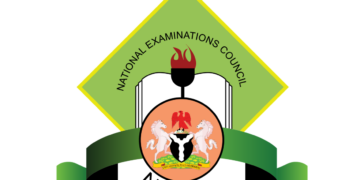As the nation grapples with the twin challenges of brain drain and an overstretched health sector, the Tertiary Education Trust Fund (TETFund) has taken a decisive step, not only in funding medical education but in ensuring those funds deliver lasting impact.
Recently, TETFund inaugurated the Ministerial Monitoring Committee on its High Impact Intervention Project for Medical Schools Rehabilitation.
The inauguration of the committee marks a shift toward sustainable reform and the strategic reshaping of Nigeria’s medical training.
Speaking during the inauguration of the committee, Executive Secretary of TETFund, Arch. Sonny Echono, expressed appreciation to President Bola Tinubu and the Hon. Minister of Education, Dr. Maruf Alausa for their vision and commitment to the Fund’s intervention activities and particularly the strengthening and repositioning of institutions in the nation’s health sector through TETFund’s intervention in medical schools for the Year 2025 Special High Impact Programme to Universities.
He said the setting up of this committee was conceived as part of the Hon. Minister’s initiative to enhance the Nigerian education system, specifically the medical schools by utilising the TETFund High Impact Intervention Projects efficiently and effectively to address critical national needs in the health sector.
“This has been designed to improve infrastructure in medical schools, through the rehabilitation of lecture theatres and laboratory facilities, thereby enhancing capacity to take in and produce more doctors, nurses, dentists, and pharmacists for the nation.
“There is absolutely no doubt that the intervention will go a long way in solving some of the challenges facing the health sector in the country. The provision of critical manpower in the health sector remains a huge challenge. The problems of insufficient and unqualified medical personnel have lingered for far too long.
“The challenges of ill-equipped medical facilities have also persisted. It is for these reasons that the intervention is considered not only important but also timely. As I welcome our indefatigable Hon. Minister of Education and his entourage to the Fund, it is my sincere hope that the newly constituted committee members will be well abreast of their responsibilities and will deliver on this important national assignment. I am confident that the members will deliver on this onerous responsibility assigned to them,” he added.
Minister of Education, Dr. Maruf Alausa, said the project has far-reaching implications for the future of healthcare in Nigeria and is a crucial step in transforming the country’s medical education infrastructure, ensuring that medical professionals are equipped with the best resources to meet the evolving challenges of the healthcare sector.
According to him, medical education is the bedrock of any country’s healthcare system. In every society, healthcare professionals are at the forefront of providing critical services to citizens.
“For Nigeria, with its growing population and diverse health challenges, investing in the training and development of medical professionals has never been more urgent. The need for well-trained, highly skilled medical personnel is paramount, and this can only be achieved through access to quality education, state-of-the-art facilities, and a robust curriculum that prepares future doctors, nurses, and healthcare specialists for the complexities of the modern healthcare system.
“It is in this regard that the TETFund High Impact Intervention Project for the rehabilitation of our medical schools comes as a timely and visionary initiative. The project is designed to address the infrastructural gaps in our medical schools, provide necessary resources for research and teaching, and enhance the overall learning environment for our medical students.”
He added that TETFund has been at the forefront of transforming tertiary education in Nigeria, playing a pivotal role in enhancing the quality of education in universities and other higher institutions. The Fund has contributed immensely to the development of infrastructure, research capacity, and academic welfare of both staff and students.
According to the Minister, the TETFund High Impact Intervention Project is a direct response to the need to upgrade and expand the facilities at medical schools, ensuring that they are equipped with the latest technologies and resources.
“This is a significant milestone in the government’s commitment to improving medical education in Nigeria and ultimately improving healthcare delivery in the country. As we inaugurate the Ministerial Monitoring Committee today, we are setting the stage for rigorous oversight and accountability in the execution of this project. This committee will be charged with ensuring that the funds allocated to the rehabilitation of our medical schools are used effectively and efficiently.
‘They will monitor progress, assess challenges, and ensure that the goals of this project are met in a timely manner. The committee will also be responsible for ensuring that all stakeholders—including medical school administrators, faculty, students, and relevant health bodies are fully engaged throughout the project’s implementation. It is imperative that the voices of those who are directly impacted by these reforms are heard and considered as we move forward with the project.”
He also emphasised the need for continuous collaboration with the Nigeria Medical Association (NMA), the Nigerian Universities Commission (NUC), and other relevant bodies to ensure that the reforms align with global best practices and reflect the needs of the population.
“The rehabilitation of medical schools will have a profound impact on the quality of medical education in Nigeria. This intervention will enhance Learning Facilities, modernised classrooms, laboratories, and clinical training facilities will provide students with a conducive environment for learning.
“It will also support Research and Innovation, advanced research facilities and equipment will enable medical students and faculty to conduct research that will drive medical innovations and address health challenges specific to Nigeria, improve Healthcare Delivery**: Well-trained medical professionals will contribute to better healthcare outcomes across the country, particularly in underserved areas.
“As we embark on this transformative journey, I urge all those involved to maintain a sense of urgency and commitment to the task at hand. The rehabilitation of our medical schools is not just a physical upgrade of infrastructure, it is a moral imperative to ensure that future generations of healthcare professionals are equipped with the skills and knowledge necessary to meet the healthcare needs of our nation.”
The inauguration of the committee, he said, is a monumental step toward achieving a better and more effective healthcare system in Nigeria. He noted that the government is committed to improving the quality of medical education and that this intervention will contribute immensely to shaping the future of healthcare.
On her part, the Minister of State for Education, Prof. Suwaiba Said Ahmad, said the High Impact Intervention Project for Medical Schools Rehabilitation is one of the government’s key initiatives to foster excellence in medical education, enhance the quality of healthcare training, and equip future doctors and healthcare professionals with the skills and facilities necessary to meet the demands of an ever-evolving medical landscape.
“As we all know, the state of medical education infrastructure has faced many challenges in recent years, and it is no secret that a well-equipped medical school is fundamental to ensuring that our doctors, nurses, and healthcare workers are trained to deliver quality care to our people. The government, through the intervention of TETFund, has demonstrated its unwavering commitment to improving these facilities.
“This initiative seeks to rehabilitate and upgrade medical schools across the country, ensuring that the next generation of healthcare professionals is trained in state-of-the-art environments that reflect global best practices. The establishment of this Ministerial Monitoring Committee is a clear indication of the importance we place on the effective oversight and implementation of this project.
“The Committee will ensure that funds allocated are judiciously spent, that timelines are met, and that the rehabilitated schools are equipped with cutting-edge facilities and resources. Through your collective efforts, we can significantly impact the future of medical education in Nigeria.”
Also speaking, Professor Paulinus Chijioke Okwelle, Executive Secretary of the National Commission for Colleges of Education (NCCE), said the intervention is going to touch almost everybody in the country.
“If we have the right medical persons in the right quantity, then everybody will benefit from it. We appreciate the excellency for giving approval for this. We also thank the Honourable Minister and the Education Ministry for driving this. And thank you for yourself for coming very fast. We believe that this, in no distant time, will impact the effects in the nation.”
The Senior Special Assistant to the President on Student Engagement, Hon. Sunday Asefon, thanked the Honourable Minister and ES of TETFund for setting up the committee that Nigerian students have long awaited.
“I think coming up with this committee, this committee will be the eyes of the minister, will be the eyes of the heirs of TETFund in all medical schools. And I’m sure the entire student body who are going to be the beneficiaries of these upgraded projects in all our campuses, we are saying thank you to all of you who have come together and put this together for the benefit of Nigerian students.
“And I want to say that it is in line with the renewal of President Bola Ahmed Tinubu and as such, today and the next month will mark two years of an uninterrupted academic calendar on our campus.”
The 12-man committee, which is chaired by Prof. Suleiman Alabi-Chairman of the Association of Provosts of Colleges of Medicine, has its terms of reference to include ensuring adherence to project goals, monitoring the proper use of funds, and maintaining detailed records.
The committee was also charged to ensure that the funds allocated to the rehabilitation of medical schools are used effectively as well as be responsible for ensuring that all stakeholders including medical school administrators, faculty, students, and relevant health bodies are fully engaged throughout the project’s implementation.
The beneficiary universities for the TETFund High Impact Intervention Project for Medical Schools Rehabilitation are Nnamdi Azikiwe University, Awka, Bayelsa State University, University of Lagos, Ahmadu Bello University, Zaria, University of Benin and Imo State University, Owerri.
Others are University of Medical Sciences Ondo, University of Ibadan, Benue State University, Makurdi, Umar Musa Yar’Adua University, Katsina, University of Nigeria, Nssuka and University of Calabar, amongst others.





